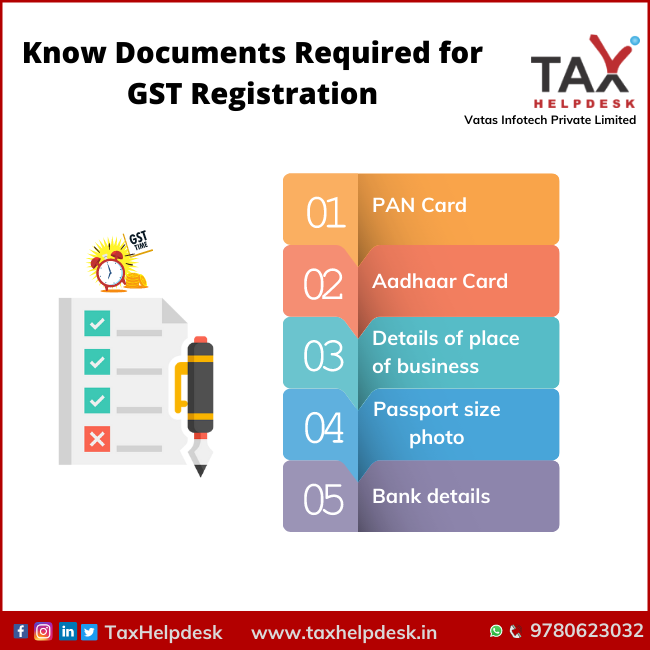From Beginning To End: The Ultimate Roadmap to GST Enrollment for Companies Looking For Financial Security
Navigating the complexities of Item and Provider Tax (GST) registration is a critical action for services striving for economic stability. From recognizing the basic concepts of GST to abiding by post-registration guidelines, the procedure can appear discouraging initially glance. Nonetheless, damaging down the roadmap right into convenient actions can improve the registration trip for businesses aiming to boost their financial standing. Let's check out the vital components that make up this best roadmap and find just how each phase adds to laying a solid foundation for monetary success.
Recognizing GST Basics
Delving into the fundamental principles of Item and Provider Tax (GST) is important for getting a detailed understanding of its ramifications on companies and the economic situation. Input Tax Credit Score (ITC) is a considerable feature of GST, enabling organizations to assert debt for taxes paid on inputs, lowering the general tax obligation problem. Understanding the fundamentals of GST is crucial for services to conform with tax obligation guidelines, manage their finances efficiently, and contribute to the country's financial development by getting involved in a clear tax obligation system.
Qualification Standards for Enrollment
To sign up for GST, businesses must meet specific qualification requirements established by the federal government. The key qualification need is that any organization involved in the supply of items or services with a yearly aggregate turn over over the threshold limitation established by the authorities have to sign up for GST. Since the existing guidelines, the threshold limitation for GST registration is a yearly accumulation turn over of 40 lakhs for services operating within a state, except for unique group states where the limitation is 20 lakhs. Additionally, particular companies are needed to register for GST regardless of their turnover, such as interstate vendors, informal taxed persons, and organizations reliant pay tax under the reverse charge device. It is vital for services to thoroughly examine their turnover and transaction types to identify their GST registration responsibilities accurately. Failing to register for GST when eligible can cause charges and legal consequences, making it crucial for organizations to comply with the defined eligibility requirements.
Documents Required for Registration
Having met the qualification requirements for GST enrollment, organizations should now ensure they have the requisite records in position to continue with the enrollment process effectively. The records needed for GST registration usually include evidence of company constitution, such as collaboration act, registration certificate, or incorporation certificate for different types of services. In addition, services require to give files establishing the principal business, such as a rental agreement or power costs. Frying pan card of the business, as well as the identity and address evidence of promoters/partners/directors, are important for confirmation objectives. Savings account declarations, along with terminated cheques or a duplicate of the bank passbook, are called for to verify the economic details supplied during enrollment. Companies must have electronic trademarks all set for the licensed click here to find out more signatory. Guaranteeing all these papers are arranged and easily available will speed up the GST registration process, allowing services to follow tax obligation laws seamlessly.
Step-by-Step Registration Refine
Starting the GST enrollment procedure includes a collection of structured steps to ensure a certified and smooth enrollment for organizations. The very first step is to go to the GST website and fill up out the registration form with accurate details of business entity. Following this, the applicant receives a Temporary Referral Number (TRN) which is utilized to resume the application procedure if it's not finished in one go.
Following, all required records according to the list offered by the GST portal need to be uploaded. These records normally consist of evidence of business enrollment, identity and address evidence of marketers, monetary declarations, and organization entity's PAN card.

Post-Registration Conformity Guidelines

Conclusion
Finally, services seeking monetary stability needs to comprehend the basics of GST, fulfill qualification standards, collect needed documents, adhere to the detailed registration process, and follow post-registration guidelines - Best GST registration services in Singapore. By sticking to these actions, organizations can ensure compliance with tax obligation laws and keep economic stability over time
In addition, particular companies are needed to register for GST irrespective of their turn over, such as interstate distributors, informal taxed individuals, and organizations responsible to pay tax obligation under the reverse charge device.Having fulfilled the qualification requirements for GST enrollment, services must now guarantee they have the requisite documents in location to proceed with the registration process successfully. The papers required for GST enrollment usually include proof of business constitution, such as collaboration act, registration certificate, or unification certificate for different types of organizations. In addition, services need to supply records establishing the major location of organization, such as a rental arrangement or electricity costs.Starting the GST registration procedure includes a series of structured actions to make certain a compliant and seamless registration for organizations.